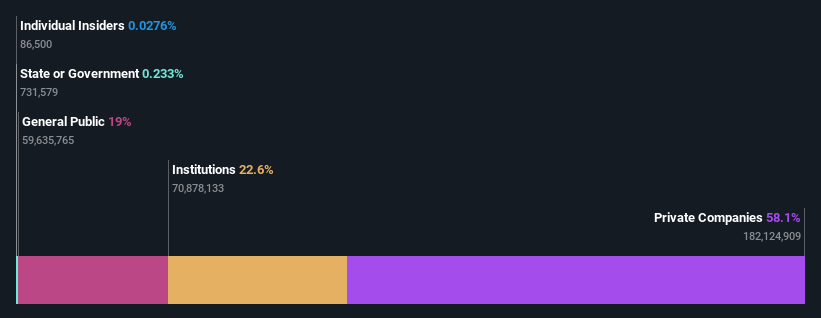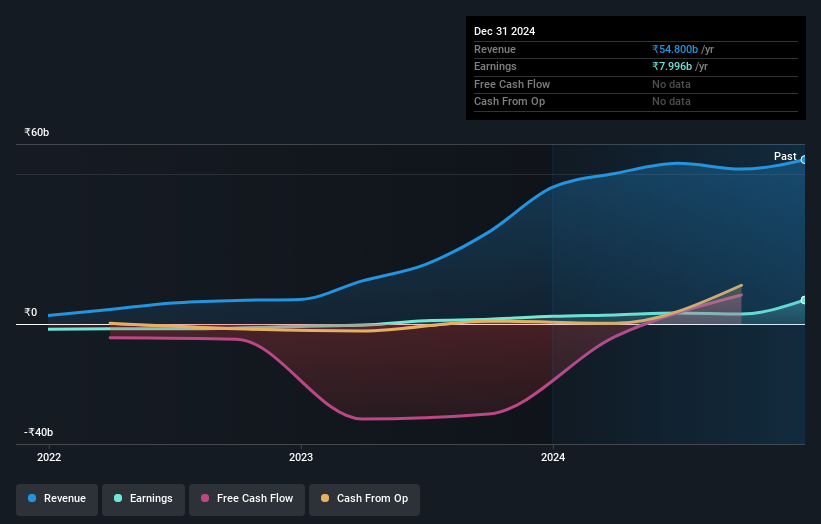Institutions along with private companies who hold considerable shares inSwan Energy Limited (NSE:SWANENERGY) come under pressure; lose 5.2% of holdings value
Key Insights
- Swan Energy's significant private companies ownership suggests that the key decisions are influenced by shareholders from the larger public
- 52% of the business is held by the top 6 shareholders
- 23% of Swan Energy is held by Institutions
Every investor in Swan Energy Limited (NSE:SWANENERGY) should be aware of the most powerful shareholder groups. With 58% stake, private companies possess the maximum shares in the company. In other words, the group stands to gain the most (or lose the most) from their investment into the company.
Following a 5.2% decrease in the stock price last week, private companies suffered the most losses, but institutions who own 23% stock also took a hit.
Let's delve deeper into each type of owner of Swan Energy, beginning with the chart below.
See our latest analysis for Swan Energy

What Does The Institutional Ownership Tell Us About Swan Energy?
Institutional investors commonly compare their own returns to the returns of a commonly followed index. So they generally do consider buying larger companies that are included in the relevant benchmark index.
Swan Energy already has institutions on the share registry. Indeed, they own a respectable stake in the company. This can indicate that the company has a certain degree of credibility in the investment community. However, it is best to be wary of relying on the supposed validation that comes with institutional investors. They too, get it wrong sometimes. If multiple institutions change their view on a stock at the same time, you could see the share price drop fast. It's therefore worth looking at Swan Energy's earnings history below. Of course, the future is what really matters.

We note that hedge funds don't have a meaningful investment in Swan Energy. Dave Impex Pvt Ltd is currently the largest shareholder, with 15% of shares outstanding. Swan Realtors Private Limited is the second largest shareholder owning 13% of common stock, and Swan Engitech Works Pvt Ltd holds about 12% of the company stock.
We also observed that the top 6 shareholders account for more than half of the share register, with a few smaller shareholders to balance the interests of the larger ones to a certain extent.
Researching institutional ownership is a good way to gauge and filter a stock's expected performance. The same can be achieved by studying analyst sentiments. We're not picking up on any analyst coverage of the stock at the moment, so the company is unlikely to be widely held.
Insider Ownership Of Swan Energy
The definition of company insiders can be subjective and does vary between jurisdictions. Our data reflects individual insiders, capturing board members at the very least. The company management answer to the board and the latter should represent the interests of shareholders. Notably, sometimes top-level managers are on the board themselves.
Insider ownership is positive when it signals leadership are thinking like the true owners of the company. However, high insider ownership can also give immense power to a small group within the company. This can be negative in some circumstances.
Our information suggests that Swan Energy Limited insiders own under 1% of the company. We do note, however, it is possible insiders have an indirect interest through a private company or other corporate structure. It's a big company, so even a small proportional interest can create alignment between the board and shareholders. In this case insiders own ₹37m worth of shares. It is always good to see at least some insider ownership, but it might be worth checking if those insiders have been selling.
General Public Ownership
With a 19% ownership, the general public, mostly comprising of individual investors, have some degree of sway over Swan Energy. This size of ownership, while considerable, may not be enough to change company policy if the decision is not in sync with other large shareholders.
Private Company Ownership
It seems that Private Companies own 58%, of the Swan Energy stock. It's hard to draw any conclusions from this fact alone, so its worth looking into who owns those private companies. Sometimes insiders or other related parties have an interest in shares in a public company through a separate private company.
Next Steps:
I find it very interesting to look at who exactly owns a company. But to truly gain insight, we need to consider other information, too.
I like to dive deeper into how a company has performed in the past. You can find historic revenue and earnings in this detailed graph.
Of course this may not be the best stock to buy. Therefore, you may wish to see our free collection of interesting prospects boasting favorable financials.
NB: Figures in this article are calculated using data from the last twelve months, which refer to the 12-month period ending on the last date of the month the financial statement is dated. This may not be consistent with full year annual report figures.
New: Manage All Your Stock Portfolios in One Place
We've created the ultimate portfolio companion for stock investors, and it's free.
• Connect an unlimited number of Portfolios and see your total in one currency
• Be alerted to new Warning Signs or Risks via email or mobile
• Track the Fair Value of your stocks
Have feedback on this article? Concerned about the content? Get in touch with us directly. Alternatively, email editorial-team (at) simplywallst.com.
This article by Simply Wall St is general in nature. We provide commentary based on historical data and analyst forecasts only using an unbiased methodology and our articles are not intended to be financial advice. It does not constitute a recommendation to buy or sell any stock, and does not take account of your objectives, or your financial situation. We aim to bring you long-term focused analysis driven by fundamental data. Note that our analysis may not factor in the latest price-sensitive company announcements or qualitative material. Simply Wall St has no position in any stocks mentioned.
About NSEI:SWANCORP
Swan
Manufactures and markets cotton, polyester cotton, linen and viscose fabrics, and non-lycra products in India and internationally.
Solid track record with adequate balance sheet.
Market Insights
Community Narratives



